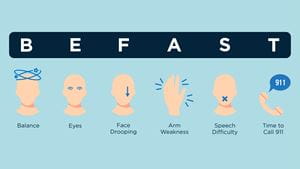
Knowing the signs of a stroke – which include facial drooping, arm/leg weakness, speech difficulty, confusion, and balance issues – is an important first step in helping you to recognize and take quick action if you or someone else is having a stroke.
BEFAST is an acronym commonly used to identify the symptoms of a stroke. BEFAST stands for:
But what’s the next step? What should you do if you think you or someone else is experiencing a stroke? Dr. Christopher Deline, a vascular neurologist and Medical Director for Rochester Regional Health’s Stroke Centers provides helpful tips on what to do next.
If you or someone else are experiencing the signs and symptoms of a stroke, call 911 immediately and let the operator know what’s happening. If you can, keep track of the symptoms and when they happened – this can help emergency personnel determine the right treatment plan.
“Stroke can be life-threatening and can lead to permanent disability so you need to act fast,” Dr. Deline said. “Calling 911 at the onset is key to better outcomes so the patient can get to a hospital quickly for eligible time sensitive treatments.”
While you wait for emergency responders to arrive, try to remain calm. The person experiencing the symptoms of stroke should lie down on a flat surface with their head slightly raised to help ease blood flow. Loosening any tight clothing that could cause blood restriction may also help.
Don’t delay care. “What’s most important, is getting the person experiencing stroke symptoms expert care in the quickest and safest way,” Dr. Deline said. “You should always err on the side of caution and call 911 if you notice any of these symptoms, even if they seem to disappear.”
Don’t drive yourself or someone possibly experiencing a stroke to the hospital. Wait for emergency medical services (EMS) responders to arrive at your location and stay with the patient until that happens. EMS responders can pre-notify hospitals of their arrival, which can expedite evaluations and treatments at the hospital. They also have special tools that help them start life-saving treatments right away, on their way to the emergency room.
While you’re waiting, don’t let the person experiencing a stroke take any medication (especially aspirin) or consume food or drink. “A stroke can cause muscle weakness throughout the body, sometimes affecting a person’s ability to swallow," Dr. Deline said. “If a patient is unable to swallow, they could choke on any food or water.”
As frightening as it can be to witness someone having a stroke, taking a few key steps—and avoiding others—can potentially help you or your loved one have the best possible outcome. “We have a process in place to treat someone who is having a stroke critically once they get here,” Dr. Deline said. “But time is of the essence and they really need to get here as quickly as they can.”